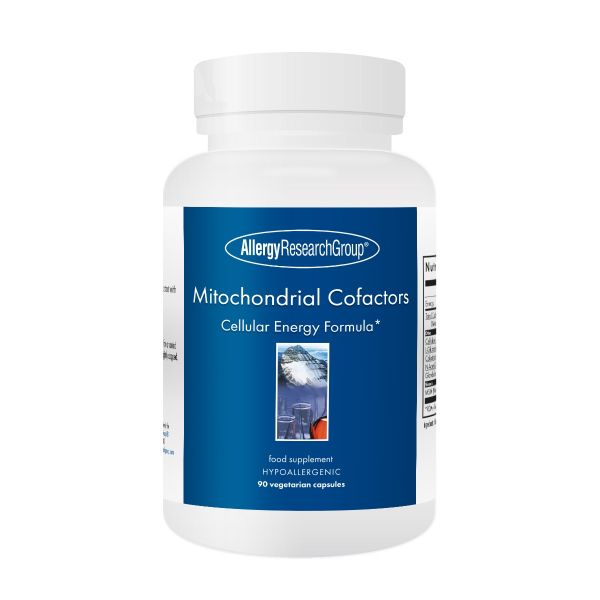Mitochondrial Cofactors x 90 Capsules
Kreb’s cycle metabolite support, including CoQ10, acetyl-L-carnitine, PANMOL® NADH, as well as vitamin B6 and magnesium, providing key mitochondrial support nutrients to support ATP production.





order before 2pm for next working day delivery (UK Only)
Food supplements should not be used as a substitute for a balanced and varied diet.


DESCRIPTION
Kreb’s cycle metabolite support, including CoQ10, acetyl-L-carnitine, PANMOL® NADH, as well as vitamin B6 and magnesium, providing key mitochondrial support nutrients. These bioactive cofactors have been shown to enhance energy production, with particular benefits for skeletal muscles, heart, and brain.
This combination of nutrients is aimed at supporting ATP production by activating key mitochondrial enzymes. In particular the acetyl-l-carnitine facilitates the transport of fatty acids into the mitochondria for use as fuel. These nutrients may alleviate normal everyday mental and physical fatigue.
CoQ10 Ubiquinone (Ubidecarenone) is an excellent source of coenzyme Q10, a cofactor that has both bioenergetic and antioxidant properties. The main function of CoQ10 is to transfer electrons along the complexes of the mitochondrial electron transport chain, culminating in the formation of ATP. Low levels of CoQ10 are consistently associated with fatigue. In human studies, supplementation with CoQ10 increased mitochondrial efficiency in the brain. Healthy adults consuming CoQ10 experienced significantly less fatigue and greater exercise capacity compared to placebo groups.
NADH (PANMOL®) is a microencapsulated form of nicotinamide adenine dinucleotide (NADH), a bioactive derivative of niacin (vitamin B3). NADH serves an electron carrier for the ultimate production of ATP. An analysis of human mitochondria revealed that NADH metabolism was one of the most important biological determinants of fatigue. In a clinical study, individuals were asked to rate the extent to which fatigue had interfered with certain aspects of their day-to-day functioning. Those who received supplemental NADH, along with CoQ10, reported improvements in physical and cognitive functioning after eight weeks.
Acetyl-L-Carnitine is a short-chain ester of L-carnitine that is naturally produced in the body. However, the biosynthesis of carnitine only accounts for 25% of daily needs. Carnitine plays a key role in energy metabolism, since it enables fatty acids to enter the mitochondria, where they are broken down to form ATP. Low blood and tissue carnitine levels often correlate with fatigue. Supplemental carnitine was shown to increase energy production in the brain and to reduce muscle fatigue under various conditions. In clinical studies, individuals receiving carnitine reported greater subjective energy levels compared to placebo groups.
Pyridoxal-5-phosphate (PLP, also known as P5P) is a form of vitamin B6 that serves as a cofactor for numerous biosynthetic enzymes. PLP is needed for the synthesis of haeme, the oxygen-binding molecule within haemoglobin, which supplies oxygen to every tissue in the body. A supply of PLP is important for normal heart and skeletal muscle contractions. The intake of vitamin B6 also upregulates pathways that promote the growth and repair of skeletal muscle. Low PLP levels are associated with decreased mitochondrial oxidative capacity and fatigue.
Magnesium Bisglycinate Chelate is a highly soluble form of magnesium that is chelated with the neutral amino acid, glycine. Magnesium influences the rate of ATP production by stimulating the activity of several enzymes in the trichloroacetic acid cycle (TCA, also known as the Kreb’s cycle). Additionally, magnesium plays a pivotal role in the activity of the mitochondrial ATP synthase, the enzyme that produces the bulk of cellular ATP. Human and animal studies have shown that magnesium supports the normal daily functioning of the heart, brain, and skeletal muscle. Healthy adults experiencing fatigue reported improved energy levels after magnesium supplementation.
Directions for use
As a food supplement, 3 capsules daily with meal. Do not exceed the recommended daily dose. Not to be used as a substitute for a varied diet.
Nutrition Facts
| Amount Per Serving: | % NRV | |
|---|---|---|
| Vitamins/Minerals | ||
| Vitamin B6 (as Pyridoxal-5-Phosphate) | 25 mg | 1786% |
| Magnesium (as Magnesium Bisglycinate) | 100 mg | 27% |
| Other | ||
| Acetyl-L-Carnitine | 300 mg | † |
| Coenzyme Q10 (Ubiquinone) | 100 mg | † |
| NADH (PANMOL® NADH) (Reduced B-Nicotinamide Adenine Dinucleotide) | 5 mg | † |
† NRV not established
Ingredients: Magnesium Bisglycinate, Acetyl-L-Carnitine, Microcrystalline Cellulose (E460i), Ubiqui, Silicon Dioxide (E551), Calcium Palmitate, Stearic Acid (E570), Nicotinamide Adenine Dinucleotide, Pyridoxal-5-Phosphate. Capsule Shell: Hydroxypropyl Methylcellulose (E464).


